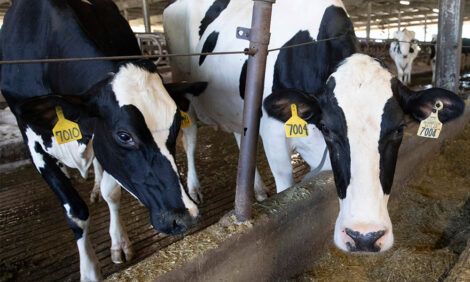



Major Funding for Research into Predicting Health, Welfare of Dairy Cows
UK - Researchers from the Moredun Research Institute and Scotland's Rural College have received a major funding award to develop a project that could ultimately lead to an early warning system for poor health and welfare in dairy cattle. Initial work by the team has found that easily recordable immune traits could be used to predict an individual farm animal's susceptibility, and recovery from, a range of health conditions.Being able to use immune traits to identify health and welfare problems - such as lameness - could be of huge benefit to the industry as they can be used to measure and monitor the health challenges that dairy cows face and develop prediction and prevention tools that could help reduce the incidence of ill health.
Current recording of health and welfare events is costly and highly labour intensive. Furthermore, such events are often missed as the signs in the cow can be subtle and difficult to detect. In contrast, immune traits can be measured in a high throughput manner in easily obtainable biological samples such as blood and milk, and may identify more subtle changes in health or welfare status.
Professor Melanie Welham, BBSRC's Director of Science, said: "As pressure increases on producing more food for a growing global population on less land, we need to ensure the highest welfare standards of the animals we farm. We need projects such as this to develop a thorough understanding of what constitutes good animal welfare and to develop accurate tools for measuring it. Being able to identify potential problems in dairy cows at the very earliest opportunity would not only save the cows from unnecessary suffering but would also prevent lost productivity associated with poor health, so representing a significant economic benefit too, for individual farmers and the dairy industry as a whole."
The results of the team's initial study - funded by the Scottish Government - on immune traits were published last night (10pm GMT 12 June) in the leading scientific journal PLOS ONE ( dx.plos.org/10.1371/journal.pone.0065766). This study was the first to evaluate multiple immune traits (e.g., levels of white blood cells, antibodies or inflammatory markers in the blood) in dairy cows on a repeated basis and relate them to common health and welfare challenges such as lameness, udder health and poor fertility. The results demonstrated that immune measures are useful as predictors of health and welfare states, and that further work would be valuable.
They have now begun a three year project (value = £700,000) funded by the Biotechnology and Biological Sciences Research Council (BBSRC) to expand this work. The aim of the new project is to further develop these immune markers to understand how they relate to the initiation and recovery from health and welfare events. The team will also examine the feasibility of developing rapid milk based immune indicators to help predict health and welfare more routinely in dairy farms.
Dr Eileen Wall, Reader in Integrative Animal Breeding at SRUC who is leading the project, said: "Health and fitness traits are a key requirement for the development of selective breeding programmes and research in this area is lacking largely due to the difficulty of recording complex traits such as lameness and mastitis in large populations of animals. We are very excited about the prospect of using easily measured immunological traits that may allow us to predict an individual's susceptibility to a variety of health and welfare challenges".
Dr Tom McNeilly, a principal investigator at the Moredun Research Institute, said: "This study represents the largest simultaneous analysis of multiple immune traits in dairy cattle to date and demonstrates that a number of immune traits are associated with health events and can be associated with susceptibility to diseases such as mastitis and lameness".
TheCattleSite News Desk



